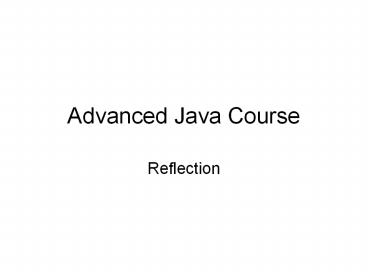Advanced Java Course PowerPoint PPT Presentation
Title: Advanced Java Course
1
Advanced Java Course
- Reflection
2
(No Transcript)
3
Reflection API
- What if you want to access information not just
about the Object, but about that Objects Class? - What if you want to access a method, field, or
constructor whose name you dont know at compile
time?
4
Example WebCrawler timer
- To optimize your WebCrawler, first find out how
long each big operation is taking. - Getting content from URLs
- Parsing pages
- Setting up Database Connection Statement
- Deleting from the Database
- Inserting into the Database
- Other?
5
How to time an operation?
- Without reflection
- int startTime System.currentTimeMillis()
- doOperation(...)
- int endTime System.currentTimeMillis()
- int duration endTime startTime
- Problem
- Code is repeated every place you want to time an
operation! Not clean at all...
6
A better way to time an operation
- Object timeMethod(String methodToCall, Class
argTypes, Object args, String
timeToUpdateField) ... - timeMethod(methodName, new Class ..., new
Object ..., timeStoringField) - No code repetition, less clutter!
7
Classes in the Reflection API
- Class Class
- Class Constructor
- Class Field
- Class Method
8
(No Transcript)
9
Getting an Object of type Class
- If you have an instance of the class
- Class classObject instanceObject.getClass()
- If you know the name of the class at compile
time - Class classObject ClassName.class
- If you know the name of the class at run time
- Class.forName(...)
- If you want a primitive type class, and you know
the name of the wrapper class at compile time - Integer.TYPE, Long.TYPE, etc
10
some methods in the Class class
- getName()
- getSuperClass()
- getComponentType() null if !isArray()
- isArray()
- isInterface()
- isPrimitive()
- isInstance(Object o)
- Object newInstance()
11
Getting Constructors/Methods/Fields
- ask the Class Object for them
- classObject.getConstructors()
- classObject.getConstructor( Class argTypes)
- classObject.getDeclaredConstructors()
- classObject.getDeclaredConstructors( Class
argTypes) - Methods and Fields have analogous getters in
class Class. - you can get an array of all the c/m/f in the
class, or just one by name, and if you ask for
Declared it gives you the non-public ones as
well.
12
Objects of Type Method
- calling a method dynamically
- Object methodObject.invoke(Object o, Object
args) - getting info about it
- Class getParameterTypes()
- Class getReturnType()
- Class getExceptionTypes()
13
Objects of type Field
- Object fieldObject.get( Object o )
- also getInt(Object), getBoolean(Object), etc.
- void fieldObject.set( Object o, Object value )
- also setInt(Object o, int i), etc.
- Class fieldObject.getType() compile time, of
course - Fields of type int will have Integer.TYPE as the
result of getType(), and its a Class Object.
14
Objects of type Constructor
- Object constructorObject.newInstance( Object
args ) - Class constructorObject.getExceptionTypes()
- Class constructorObject.getParameterTypes()
15
Member Interface
- Method, Field, and Constructor classes all extend
the Member Interface - Class getDeclaringClass()
- String getName()
- int getModifiers()
16
Modifier class (static methods)
- How do you know if something is static, final,
etc.? - int getModifiers() from Member Interface
- Modifer.isStatic(int)
- Modifer.isFinal(int)
- Modifier.isProtected(int)
- etc.
17
Array class (static methods)
- Object Array.get(Object arrayObject, int i)
- void Array.set(Object arrayObject, int index,
Object value) - int Array.getLength(Object arrayObject)
- Object newInstance(Class type, int length)
- Object newInstance(Class type, int dimensions)
18
Reflection Group Task 1
- Fill in example from beginning of lecture
- Object timeMethod(String methodToCall, Class
argTypes, Object args, String
timeToUpdateField) - ...
- Please fill this in!
- ...
19
Solution to Reflection Group Task 1
- Object timeMethod(String methodToCall, Class
argTypes, Object args, String
timeToUpdateField) - throws NoSuchMethodException,
NoSuchFieldException, InvocationTargetException,
IllegalAccessException - Class c this.getClass()
- long startTime System.currentTimeMillis()
- Method m c.getMethod(methodToCall,
argTypes) - Object returnValue m.invoke(this, args)
- long endTime System.currentTimeMillis()
- Field f c.getField(timeToUpdateField)
- f.setLong(this, f.getLong(this) (endTime -
startTime)) - return returnValue
20
Reflection Group Task 2
- Fill in the class definition to call all getX
methods and print their values in the form - ClassName propertyName value
- import java.lang.reflect.
- public class PropertyValueFinder
- final String GET "get"
- public void printProperties(Object o) /fill
this in/ - private Property propertyGottenBy(Method
method) /fill this in/ - private boolean isGetter(Method method)
/fill this in/ - public class Property
- String name
- Class type
- Object value
- public Property(String name, Class type)
- this.name name
- this.type type
- public void setValue(Object value)
this.value value - public String toString() return type"
"name" "value
21
Group Task 2 Solutions
- private boolean isGetter(Method m)
- boolean nameOK m.getName().startsWith(GET)
- boolean noArgs m.getParameterTypes().length
0 - boolean nonVOID m.getReturnType() !
Void.TYPE - return nameOK noArgs nonVOID
- private Property propertyGottenBy(Method m)
- if (!isGetter(m)) return null
- Class propertyType m.getReturnType()
- String propertyName m.getName().substring
(GET.length()) - return new Property(propertyName,
propertyType)
22
Group Task 2 Solutions
- public void printProperties(Object o)
- Class oClass o.getClass()
- Method methods oClass.getMethods()
- for (int i 0 i lt methods.length i)
- Method m methodsi
- if (isGetter(m))
- try
- Object value m.invoke(o, new
Object0) - Property p propertyGottenBy(m)
- p.setValue(value)
- System.out.println(p)
- catch (IllegalAccessException e)
- throw new RuntimeException()
//programmer error - catch (IllegalArgumentException e)
- throw new RuntimeException()
//programmer error - catch (InvocationTargetException e)
- throw new RuntimeException()
//programmer error
23
Discussion Topic
- Restriction to Serializer project
- I must promise that the Objects I test your code
on will have a no-args constructor that - sets the value of any final variables that are
not set in the class definition - does not throw any exceptions.
- If you could add functionality to the Reflection
API, how would you fix this without compromising
the integrity of the keyword final? - Work in teams, and then well exchange ideas.
- Great, now go start a JSR (Java Specification
Request)! - http//www.jcp.org/en/participation/membership

